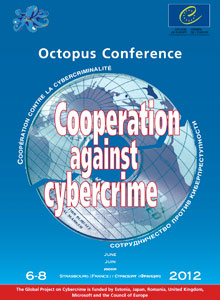Octopus Conference on Cybercrime (Strasbourg, 6-8 June 2012)
COOPERATION AGAINST CYBERCRIME
6 - 8 June 2012
Palais de l'Europe, Strasbourg
Cybercrime Convention: Protecting you and your rights
Establishing effective rules in a place everybody joins but nobody owns is a very demanding task, but rules are necessary to maximise the freedom and minimise the risks in navigating cyberspace.
This is why, on 23 November 2001, the Council of Europe adopted the Budapest Convention on the fight against cybercrime. Today, the treaty still represents the only accepted international guidelines on how to protect freedom, security and human rights online.
More than 120 countries are cooperating with the Council of Europe to reinforce their legislation and capacity to address cybercrime, many of them as part of the Cybercrime Convention, which has been ratified by 33 countries and signed by 14 others. Eight countries including Argentina, Australia and Senegal have been recently invited to join.
The Convention has had a global impact and resulted in stronger and more harmonised cybercrime legislation worldwide, more efficient international cooperation in investigating and prosecuting Internet-based crimes and closer public-private partnerships.
Cybercrime – from illegal intrusion into computers, to the interception of private communications, denial of service attacks, identity theft and fraud, or the sexual exploitation of children – affects the rights of individuals all over the world.
The Budapest Convention is a key guiding tool for governments to protect individuals.
As technology evolves much faster than legal responses, there is a need to constantly address new challenges, often related to data protection issues, such as transborder law enforcement access to data and information sharing between the private and public sectors.
Measures to fight online child abuse are also crucial. Insufficient or incompatible legislation in many countries is still a major obstacle to successful international prosecution of offenders. In November 2011, the Council of Europe and the Virtual Global Task Force signed a cooperation agreement to fight online child abuse and make the Internet safer for children – as part of the Interpol overall strategy.
All these challenges will be discussed at the annual cybercrime conference from 6 to 8 June 2012 in Strasbourg.


